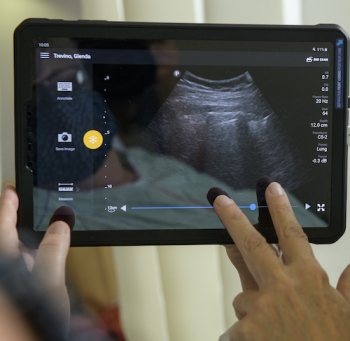 Srikar Adhikari, MD, professor of emergency medicine and director of the Emergency Medicine Ultrasound Fellowship, received an Emergency Medicine Foundation (EMF) and FUJIFILM Sonosite’s grant, which included a new Sonosite PX point-of-care ultrasound system, to support his research, "Artificial Intelligence for Prognosis of Ultrasound of the Lung in COVID (AI PULL),” examining the role of point-of-care ultrasound in the clinical care of COVID-19 patients.
Srikar Adhikari, MD, professor of emergency medicine and director of the Emergency Medicine Ultrasound Fellowship, received an Emergency Medicine Foundation (EMF) and FUJIFILM Sonosite’s grant, which included a new Sonosite PX point-of-care ultrasound system, to support his research, "Artificial Intelligence for Prognosis of Ultrasound of the Lung in COVID (AI PULL),” examining the role of point-of-care ultrasound in the clinical care of COVID-19 patients.
Fujifilm Sonosite contributed $90,000 to the EMF’s COVID-19 Research Grant fund, as well as providing Sonosite PX point-of-care ultrasound (POCUS) systems, as part of the Fujifilm Sonosite COVID-19 Point-of-Care Ultrasound Acceleration Research Grant. Dr. Adhikari and two other U.S. emergency medicine researchers each received $30,000 to support physicians investigating the role of diagnostic imaging technology – such as ultrasound – in responding to the COVID-19 pandemic.
“Our objective of this proposed work is to investigate whether L POCUS contributes to care pathways that improve quality of care by predicting the risk of decompensation among patients with suspected COVID infection and discharged from the ED,” stated Dr. Adhikari. “Our rationale is that the unique appearance and pattern of lung findings on L POCUS provides useful information that assesses the risk of future decompensation before any imaging tools currently available.”
The specific aims include:
Aim 1. Determine the prognostic capability of L-POCUS to predict a hypoxic event after index presentation among COVID cases in a prospectively collected cohort of ED patients with respiratory complaints.
We hypothesize that patients that develop hypoxia 2 hours to 40 days after initial assessment will score higher on an L-POCUS scoring scale.
Aim 2. Train convolutional neural networks (CNN) to derive a deep neural network algorithm that identifies L-POCUS patterns that predict a hypoxic event.
Hypothesis: normal and pathologic lung images can be analyzed and classified by deep learning algorithms.
Aim 3. Validate an AI's algorithm’s diagnostic capability to predict hypoxia on L-POCUS imaging data in a cohort of suspected COVID cases by comparing AI performance against expert and non-expert sonographers.
Hypothesis: AI deep learning algorithms will outperform non-expert diagnostic accuracy in predicting hypoxia among a cohort of patients suspected of COVID infection.

